The State of Children’s Rights & Business 2022



Of all the business sectors benchmarked by Global Child Forum, the Food, Beverage and Personal Care sector arguably has the greatest impact on children’s health and well-being. Some examples:
• The consumer-facing companies in this sector have a special ability to generate meaningful impacts. Marketing communications from this sector to children carry weight with young people, shaping decisions around eating behaviors and influencing diet, weight, and overall health.
Efforts by such companies to control the content and placement of marketing to children are especially critical in light of data concerning diet-related disease, poor nutrition, and obesity. UNICEF reports that almost 200 million children under age five suffer from stunting, wasting or both. At least 340 million suffer from “hidden hunger” due to vitamin and mineral deficiencies; 40 million children under age five are overweight.
Consider then the unique opportunity this sector has to counteract the impact
on children of the marketing of foods high in saturated fats, trans-fatty acids, sugar or salt. Responsible marketing alone can’t eradicate all diet-related problems, but producers and retailers of foods and beverages can take a leadership role –robustly marketing products compatible with balanced diets and healthy, active lifestyles.
• This sector continues to grapple with the impacts of child labour, especially in agricultural supply chains. The many products that contain staple raw materials such as cocoa, sugar, palm oil, and coffee are associated with children working in hazardous conditions. Worldwide, 60% of child labourers (aged 5-17) work in agriculture, including farming, fishing, livestock and forestry, meaning it impacts more than 98 million children.
• Children’s rights in the community and environment are impacted throughout the sector, from agricultural production right through to product waste and recycling. Companies in this sector may directly
harm children by exposure to harmful chemicals or contamination or overuse of local water supplies. Indirect impacts, such as environmental degradation, may also disrupt agricultural production and undermine the livelihoods of local communities, thereby making it financially impossible for children to access basic services such as health and education.
As we mark the 10th anniversary of Children’s Rights and Business Principles, it is encouraging to note the progress made by businesses. But we are also compelled to focus on the unfinished agenda. Especially during a time of rising global food insecurity – when millions of people, including children, are at risk of acute hunger – the actions of companies entrusted to produce the world’s food, beverage and care products can be instrumental in reaching the United Nations Sustainable Development Goals. And shouldn’t creating an environment in which children grow up healthy be a top priority for us all?
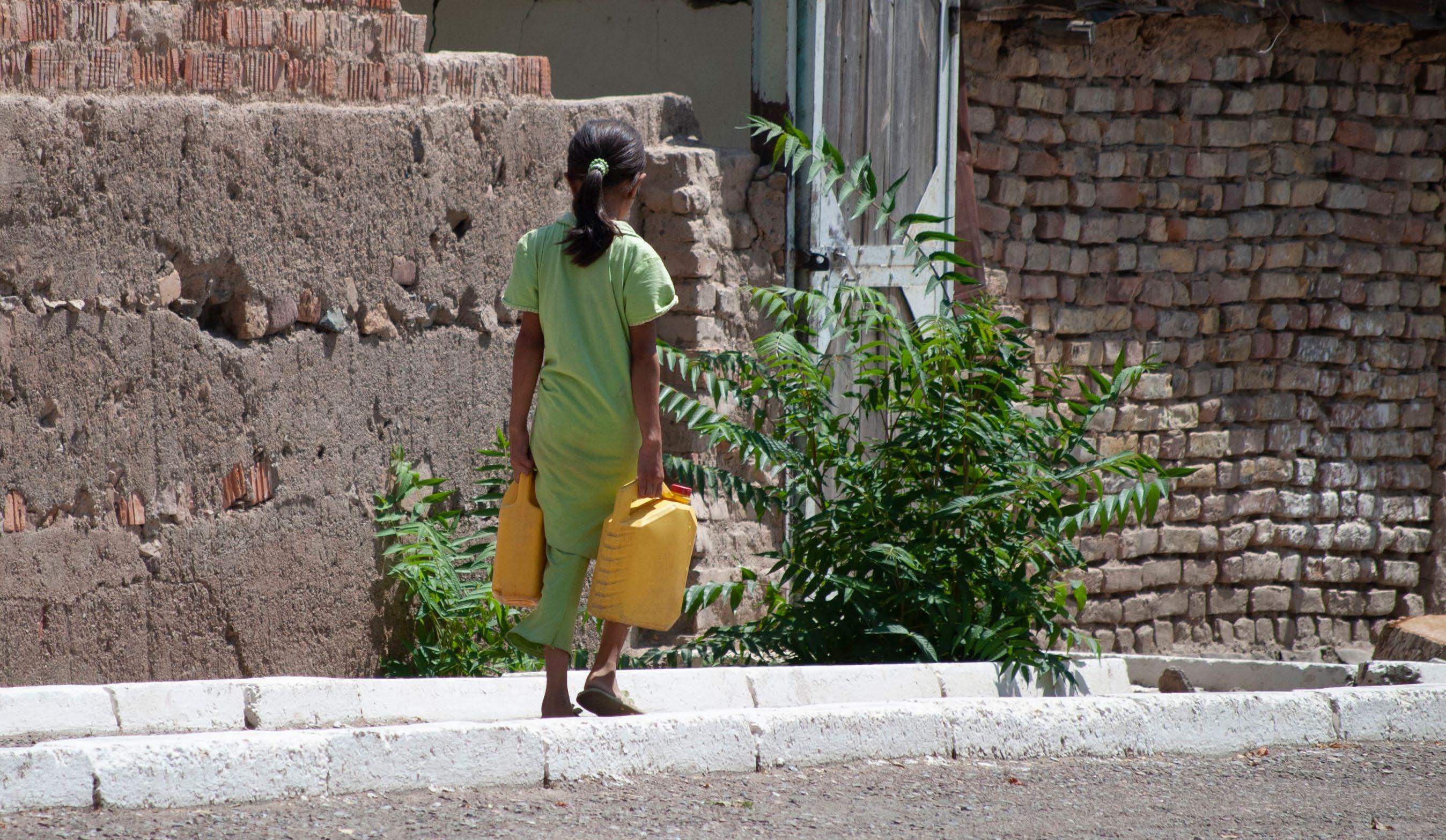
- UN Convention on the Rights of the Child’s definition (article 1):
The influence of the Food, Beverage & Personal Care sector on children's lives prompted Global Child Forum to take a close look at this sector's performance with regard to children.
This benchmark looks at 310 of the world’s largest brands and measures their impact across four areas (Governance & Collaboration, Workplace, Marketplace, and Community & Environment) for a set of 25 indicators, based on the Children’s Rights and Business Principles, a comprehensive set of principles developed by Save the Children, UN Global Compact and UNICEF to guide companies on actions they can take to respect and support children’s rights. Our sector-specific benchmark allows for a deeper analysis and understanding of how companies report on a range of policies and activities which impact children.
For more information, see “About the industries included in this study” at the end of this report. In addition, we compared 99 of the companies that were previously benchmarked in the Global Benchmark 2021.

– Scoring is based on publicly available information (in English) and was collected between March and June 2022.
– The results are based only on publicly available data, systematically assessing corporate organisational response to their impact on children’s rights.
– The results do not include evaluation of actual compliance with policies or outcomes of policies and programmes.
– All companies in the study were informed of their scores and given an opportunity to provide feedback on their results.
Definition of a child
“… a child means every human being below the age of 18 years …”
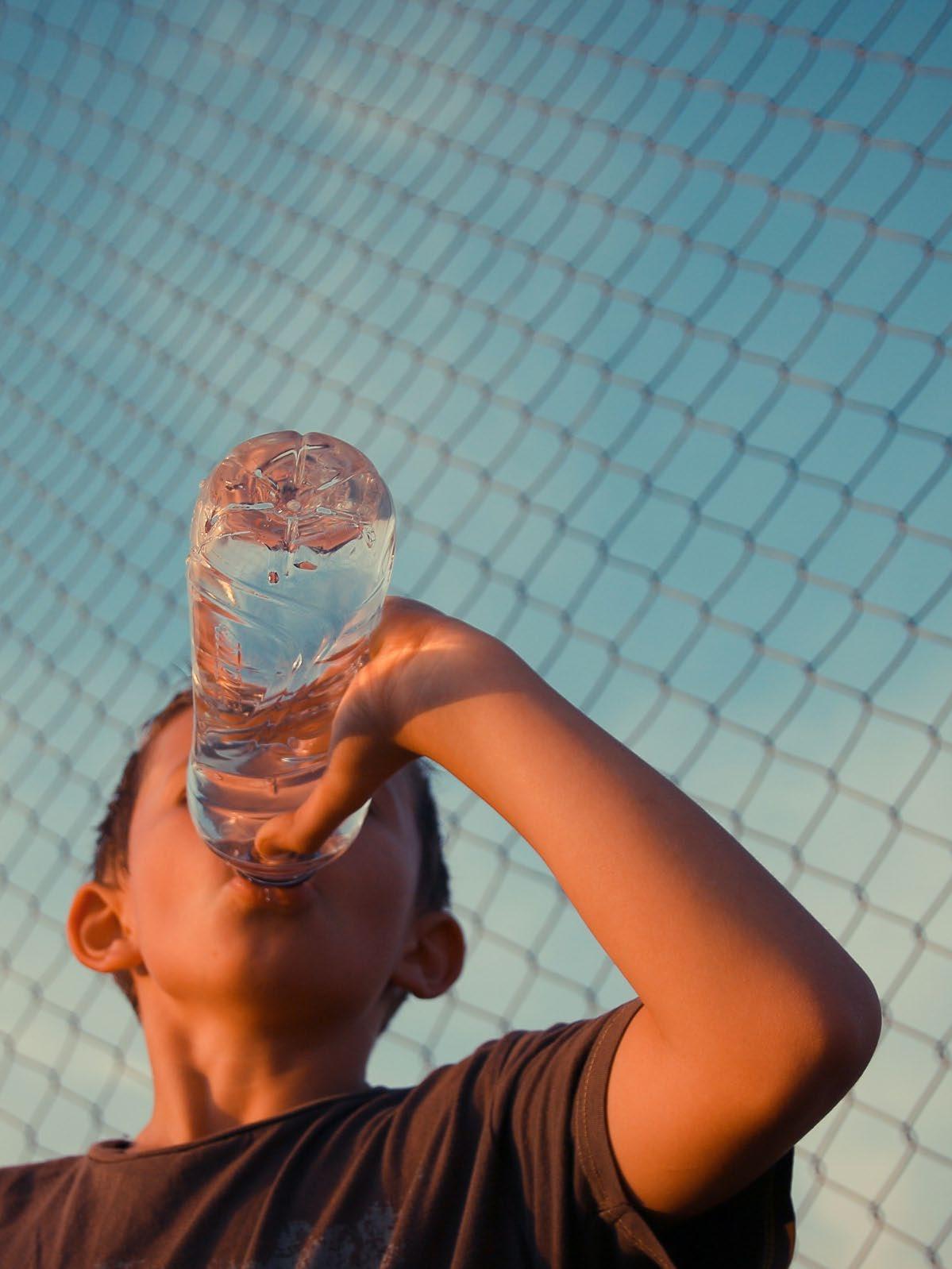
With an average score of just 2.7 (out of 10), all industries within the Food, Beverage and Personal Care sector scored lowest in the Marketplace impact area, which assesses disclosures related to how companies’ marketing, products and services impact children and teenagers.1
This is especially surprising when we look closely at the consumer-facing industries Food & Beverage and Retail – whose products and services are often available to children. In these two industries, a majority of the companies are not explicitly considering children as an especially vulnerable group in relation to their marketing and advertising, a necessary consideration even if children are not the target consumer group.

Average Marketplace score across industries
Total impact area average 2.7 %
Source:
At Unilever, we have a genuine commitment to make and market products to children responsibly. For us it’s about reducing children’s exposure to advertising by not actively targeting children below 16 years old and instead supporting parents to take control and make good choices for healthier and happier children.
Martin BareauGlobal Marketing Lead Twister, Walls Family and Licensing, Unilever
The Food & Beverage and Retail industry faces growing risks in relation to children’s rights in the marketplace. Foods high in fat, salt, and sugar (HFSS) have brought the industries into the spotlight, with a growing body of evidence showing the negative contribution of child-directed marketing and advertising of food on overweight and obesity rates in children. The World Health Organization (WHO) estimates that, with the current rate of growth, 70 million infants and young children will be overweight or obese by 2025. These children are likely to develop long-term health problems, are likely to stay obese into adulthood, and are more likely to develop diabetes and cardiovascular diseases at a younger age.
This sector has an enormous potential to support children and provide products and services that give them a healthy head
start. By developing products that meet growing children’s nutritional and hygienic needs and re-engineering products that cause negative health effects in children, companies also increase their market opportunities.
There is an opportunity for action because, although many companies are developing products and marketing them to children, not enough are taking children’s vulnerability into consideration. Whether children are an intended or an unintended portion of a given target group, a company’s product offering and external messaging should keep the best interest of children in mind.
2 The possible scores for each indicator are:
Score 0: no information could be found in relation to the topic
Score 5: general information regarding sustainability or human rights could be found for the topic, but no specific mention of children
Score 10: information mentioning children in relation to the topic could be found
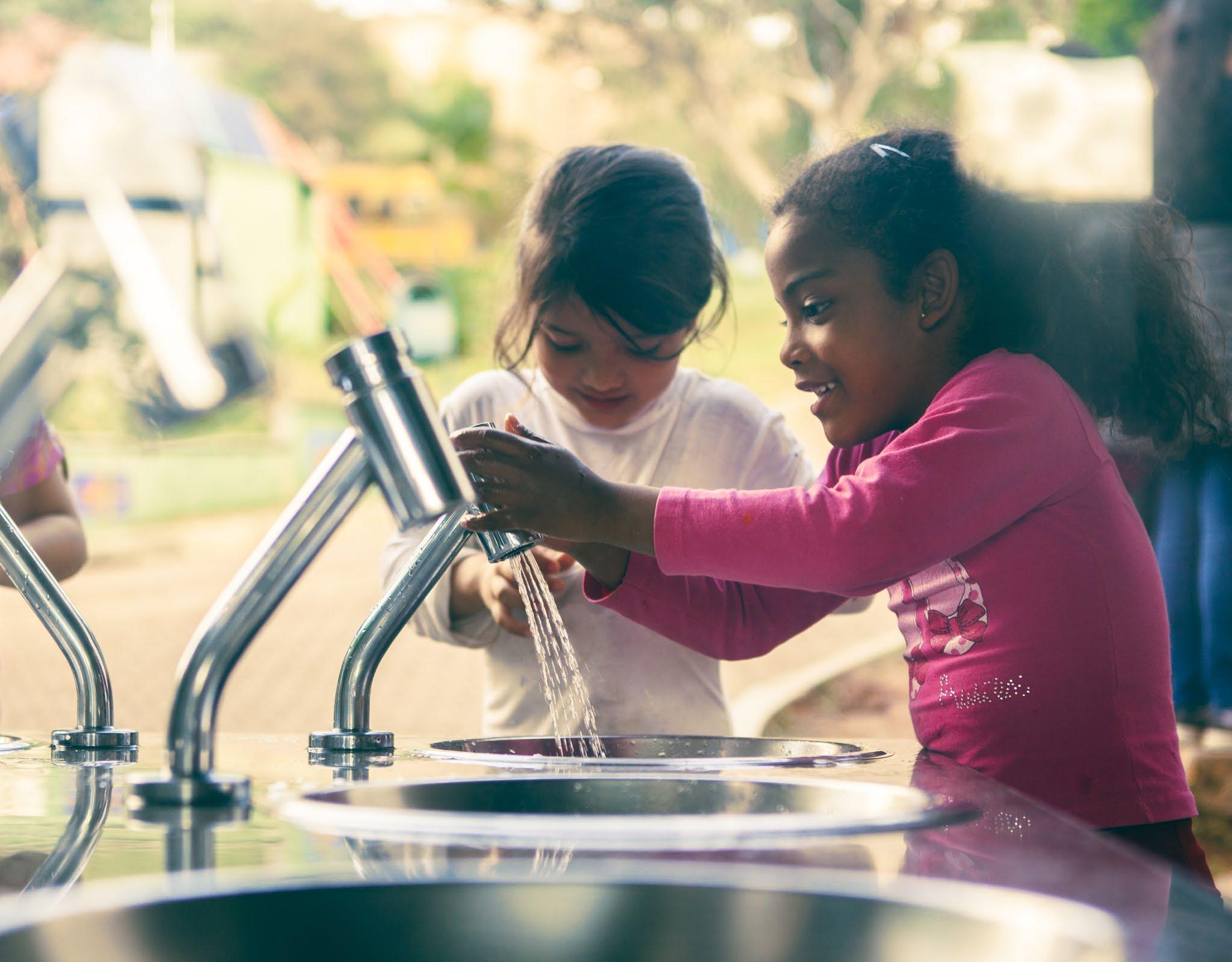
Company
“Reformulations can be made, but you also need to get the consumer on board. A big challenge is how to match consumer demand and taste with research and development as well as marketing. To support our targets to increase the uptake of nutritious products, we spend a large proportion of our marketing budget on nutritious options and work closely with consumer education programs for example through industry associations to help consumers choose the right products for their families.”
Jaren Dunning Senior Legal Director, Employment Law & Global Head of Human Rights, PepsiCoArea average score
Wilmar International 9.5
Suntory 9.0
Reckitt Benckiser (RB) 9.0
Fonterra 8.0
Aldi Nord 7.5
Symrise 7.4
Kirin Holdings 7.4
Ferrero 7.0
Unilever 7.0
Anheuser-Busch InBev 7.0
In the benchmark, impact through marketing and products or services is covered under the Marketplace Impact Area.3 The Food, Beverage & Personal Care sector impacts children’s lives in several ways in Marketplace:
• Product and service safety is particularly important when products are intended for children’s and teenagers’ consumption. Moreover, even when a product or service is not explicitly intended for children, there is the possibility of children coming into contact with it. So it follows that children should be considered from a perspective of protecting them.
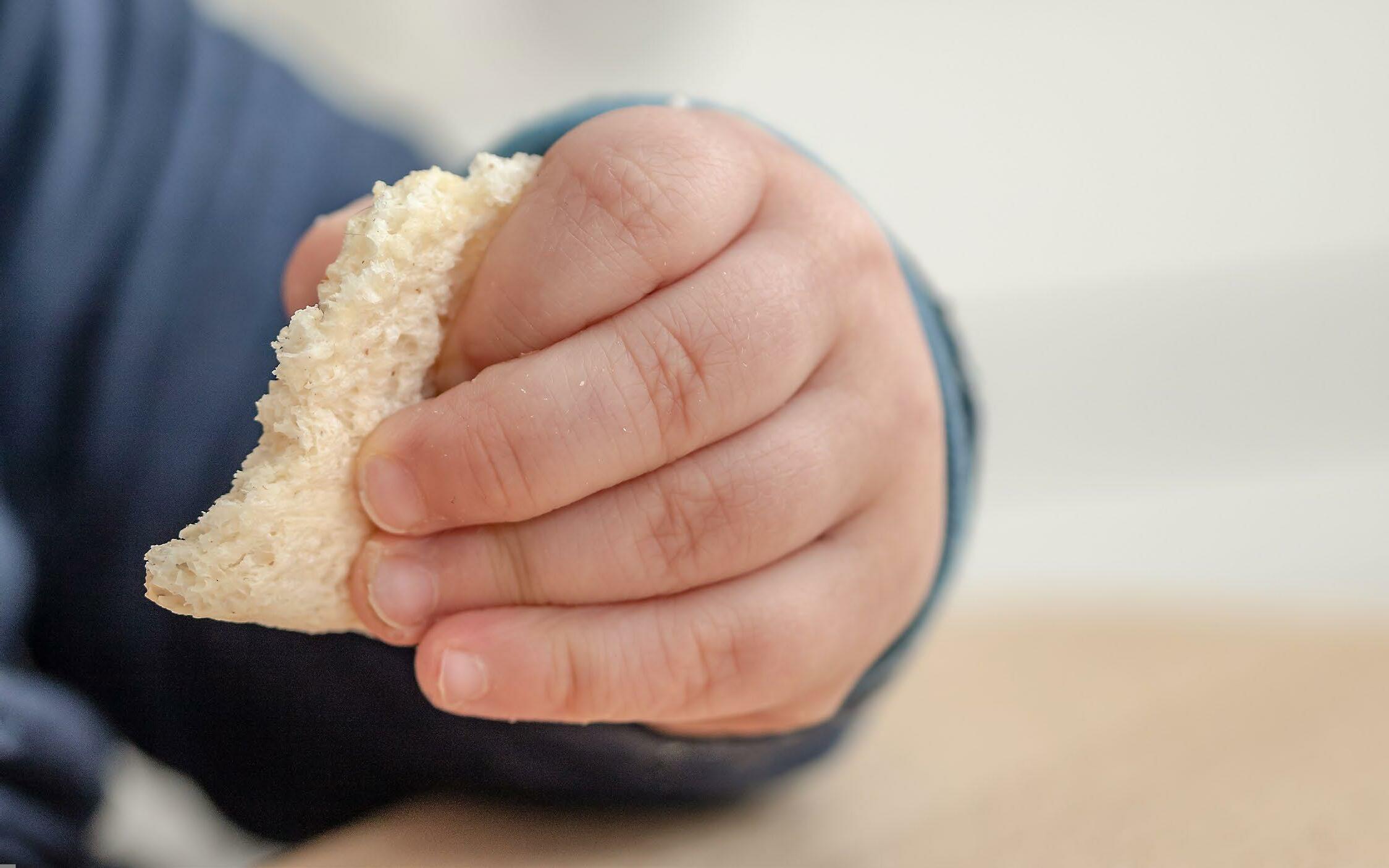
• Responsible marketing is important for children and young people as the recipients of marketing messages. Companies need to recognise and act on children’s specific vulnerabilities, putting into practice, for example, restrictions on when and to whom to market.
In addition, even if unintentionally, children and teenagers are constantly exposed to marketing messages meant for adults, especially online. Here,
companies need to consider whether they are, for example, propagating unhealthy ideals or lifestyles or considering how children and young people are portrayed in marketing to adults. Consideration should be given to determining whether a child or a young person is equipped to contextualize these messages and understand them properly.
• Products and services that support children are an often overlooked area where companies can have a significant and positive impact on children’s and teenagers’ lives by ensuring that they have access to healthy and nutritious foods or to hygiene products that take their needs into consideration.
• With positive messaging, companies have the opportunity to not only prevent harm by practicing responsible marketing but to also create positive impact. In the arena of mental health and self-esteem, for example, a company could make use of their communication platforms to reach a young audience.
3 Which also relates to Principle 5 - ALL BUSINESS SHOULD: Ensure that products and services are safe, and seek to support children’s rights through them, and Principle 6 - ALL BUSINESS SHOULD: Use marketing and advertising that respect and support children’s rights, in the Children’s Rights and Business Principles
4
With 77% of all companies in the sector disclosing that they have a policy on child labour – the majority of them highlighting the issue with respect to their supply chains – this sector indicates a clear commitment to the issue. A relatively high percentage - 48% - also discloses a process for assessing suppliers on the
same topic. However, the seriousness of the commitment is put into some doubt given that only 25% report on the outcomes or effect of their policy against child labour. And just 23% of companies disclose a preventive or remediation programme to address it. This is a pattern not unique to child labour. Indeed, a surprising 64% of the
Source: Global Child Forum data 2022, BCG analysis
The possible scores for each indicator are:
Score 0: no information could be found in relation to the topic
Score 5: general information regarding sustainability or human rights could be found for the topic, but no specific mention of children
Score 10: information mentioning children in relation to the topic could be found
companies do not report on any outcome or compliance regarding human rights commitments overall, nor do they report on any programmes or initiatives to address negative impact regarding human rights. It should be noted that those companies that do report on outcomes or identified risks regarding child labour are also among
the ones earning the highest overall scores in the study, indicating that it is primarily companies with a well-established and overall approach in relation to human and children’s rights that either have the resources to find the information, or assurance enough to report transparently on a sensitive issue.
Opportunity:
Child labour has long been a recognised concern in the sector. The United Nations (UN) estimates that more than 160 million children currently engage in child labour globally, with half of them undertaking hazardous work. Of these 160 million, 70 percent work in the agricultural sector, often as part of a food or beverage supply chain.
And, as a result of the global pandemic, strides previously made to tackle child labour have been reversed.
A further challenge: supply chains are often fractured, meaning it is an enormous task to ensure that all harvesting of raw materials and production processes comply with ethical standards. Additionally, many companies make use of small-scale farmers deep into their supply chain which rely on young family workers. Because performing such work might affect a young person’s ability to attend school or place limits on their leisure or study time, it could be seen as constituting child labour.
While no company sets out to have child labour in their supply chain, the issue is complex and requires ongoing concerted
effort by companies, governments, and civil society actors if eradication is ever to be achieved. It is also not sufficient to signal a commitment to address child labour. Any commitment must be matched by an effort to be transparent about the process, about what is being done, and what results are achieved. Absent that, there is a real risk that the policy on child labour remains just…a policy, with no tangible effect on the risk to the company or to children and their families.
There is also an opportunity for companies, through their policies, to make it easier for children to have greater access to their parents and for employees to balance family and work – thereby fulfilling both their family and work obligations.
Company
Fuji Oil Holdings
We have embraced transparent reporting as a way to change the sector. By reporting, we show that doing something and talking about it can have a big impact! We have made very specific efforts to report and communicate around child labour - and not only what goes well. We have shown that it is not only possible but necessary.
Yann Wyss Lead Social Impact, NestléIndustry Area average score
Agricultural Products 10.0
Olam International Agricultural Products 10.0
Wilmar International Agricultural Products 10.0
Anheuser-Busch InBev Food & Beverage 10.0
Diageo Food & Beverage 10.0
Ferrero Food & Beverage 10.0
Kellogg's Food & Beverage 10.0
Nestlé Food & Beverage 10.0
Suntory Food & Beverage 10.0
The Coca-Cola Company Food & Beverage 10.0
The Hershey Company Food & Beverage 10.0
L’Oreal
Personal & Household Products 10.0
Reckitt Benckiser (RB) Personal & Household Products 10.0
The Estée Lauder Companies
Unilever
Personal & Household Products 10.0
Personal & Household Products 10.0
Aeon Retail 10.0
Aldi North Retail 10.0
Aldi South Group Retail 10.0
Migros Retail 10.0
Tesco Retail 10.0
In the benchmark, impact through operations and supply chains, specifically in relation to employment, is covered under the Workplace Impact Area.5 In this area, the Food, Beverage & Personal Care sector impacts children’s lives in several ways:
• Child labour and decent work for young workers. Child labour, often the first topic that comes to mind when considering how children’s rights are relevant to the corporate sector, requires companies to take appropriate measures to assess risks, prohibit, prevent, report on findings and provide remediation. Ensuring decent working conditions and appropriate job opportunities for young people is another key element.
• Family-friendly policies and programmes are of great relevance to children’s daily lives. Family-friendly efforts by companies impact the time that children can spend with their parents (for example, through parental leave that exceeds what is legally required, availability of flexible work arrangements) and ensuring that children are looked after when parents are at work.

The area of Governance & Collaborations is the best performing across all industries, with a 5.1 average (out of 10), mainly driven by high scores for two of the indicators:
• 54% of companies reference standards and frameworks that include children’s rights, with the ILO Conventions on child labour and the UN Global Compact Principles being among those most frequently referenced. However, only a total of 15 companies out of 310 make reference to the Children’s Rights and Business Principles.6, 7

• 49% of companies collaborate with NGOs that focus on children’s rights.
It’s important that somebody acts as the internal leader to drive an understanding of the importance of considering impact on children throughout the business, and then also ensure that action is being taken, however responsibility concerns the whole company, not just one person.
Javier Rodriguez Social Investment Coordinator at Fundación ArcorAlthough over 50% of companies report that their board (or other highest governing body), takes clear responsibility for sustainability or human rights, only 17% include a child rights issue within that, such as child labour or product responsibility (see Key Takeaways 1 and 2). The same holds true with regard to grievance mechanisms. While almost 80% report on having a whistleblowing or ethics hotline, only 15% show evidence that this mechanism is available to community members8, and that human rights violations can be reported.
6 Developed by UNICEF, the UN Global Compact and Save the Children –the Children’s Rights and Business Principles (the Principles) are a set of principles to guide companies on the full range of actions they can take to respect and support children’s rights.
7 These companies are: Aldi South Group; Asahi Group; Coles Group; Diageo; Essity; Ferrero; Grupo Arcor; Kerry Group; KOSÉ Corporation; Marks & Spencer; Salling Group; Seven & I Holdings; Sime Darby Plantation; Symrise; and Wilmar International.
8 Which then also includes a possibility for children or their representatives to make complaints.
Source: Global Child Forum data 2022, BCG analysis. Note: All scores are stated as average
Generally speaking, although some companies perform well, the majority have a way to go. They stand to reap potential benefits by making use of a more holistic view of children’s rights and integrating consideration for children and young people into their operations and supply chain management.
Companies are doing well when it comes to referencing international frameworks and standards. There is, however, room for improvement with regard to awareness of other established standards that relate to children’s rights. In particular, the Children’s Rights and Business Principles provides companies with a sound framework for assessing their own impact on children and guides companies on the full range of actions that can be taken.
From the overall scores in the study – with an average score of 4.4 out of 10 – there is also room for a general improvement for companies in understanding the ways in which their business impacts children's lives. A fitting place to start is with Boards and Executive Committees – which have the power to drive change, awareness and compliance across an entire business – to more explicitly incorporate consideration for children and young people in their strategies and directives.
9 The possible scores for each indicator are:
Score 0: no information could be found in relation to the topic
Company
Amaggi Group
Industry Area average score
Agricultural Products 10.0
Cargill Agricultural Products 10.0
Wilmar International Agricultural Products 10.0
Ferrero
Food & Beverage 10.0
Fonterra Food & Beverage 10.0
Kellogg's Food & Beverage 10.0
Marfrig Food & Beverage 10.0
Nestlé Food & Beverage 10.0
PepsiCo Food & Beverage 10.0
Suntory Food & Beverage 10.0
Thai Union Group Food & Beverage 10.0
The Coca-Cola Company Food & Beverage 10.0
L’Oreal
Personal & Household Products 10.0
Reckitt Benckiser (RB) Personal & Household Products 10.0
Ahold Delhaize Retail 10.0
Aldi Nord Retail 10.0
Aldi South Group Retail 10.0
Score 5: general information regarding sustainability or human rights could be found for the topic, but no specific mention of children
Score 10: information mentioning children in relation to the topic could be found
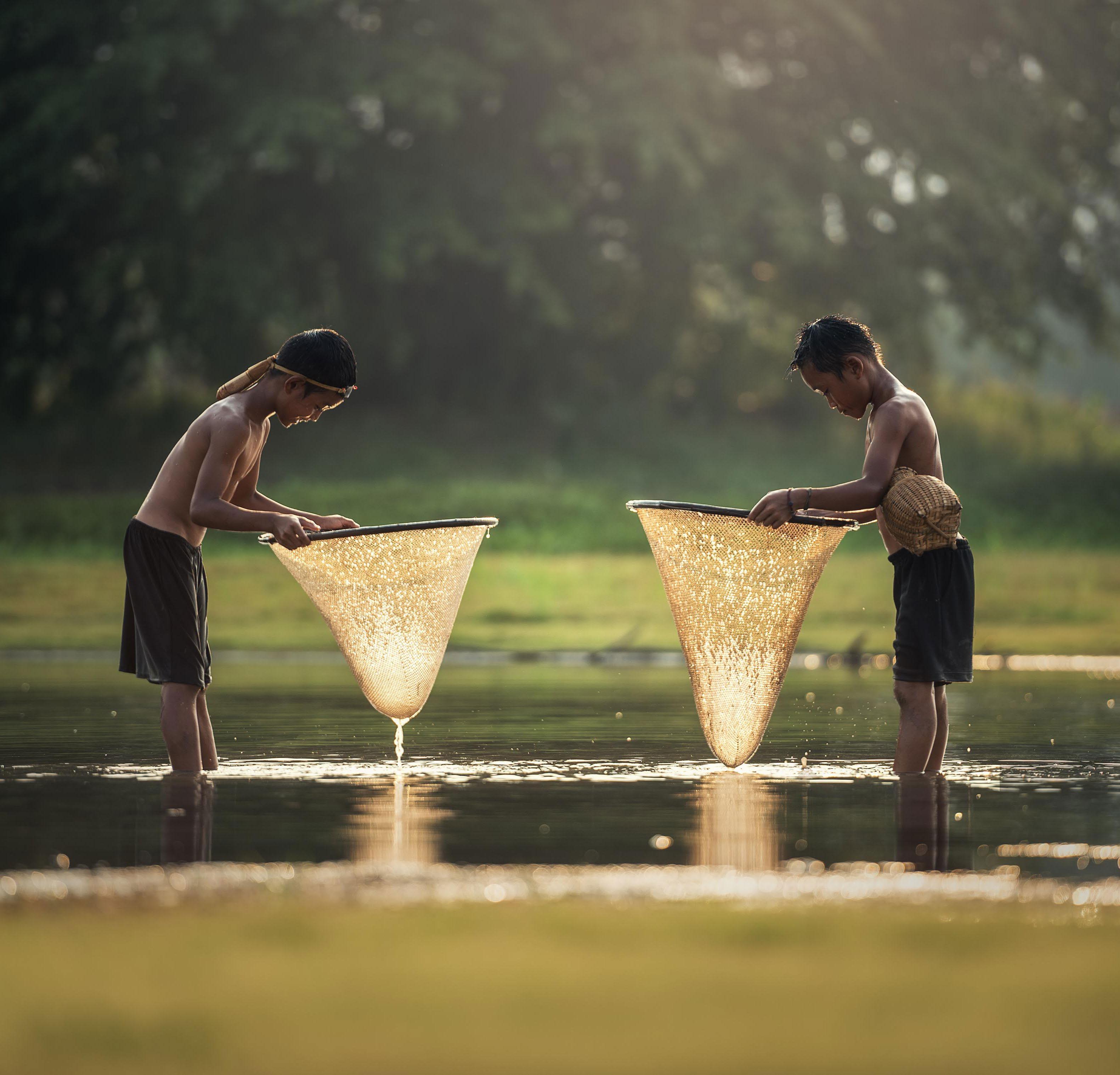
New to our benchmark methodology this year is a focus on how successfully companies integrate children’s rights into their governance mechanisms. This new area, called Governance & Collaborations, gathers indicators that were previously included in the other three impact areaas (Workplace, Marketplace and Community & Environment) and centres on:
• A company’s governance establishes the foundation for how a company views and acts with respect to its impact on children’s lives across all issues. Maintaining a clear commitment and having directives emanating from top management determines how important an issue is perceived to be across operations.
• Collaboration is key to addressing many of the areas where business impacts children’s lives. Often these issues are systemic, so a single actor has limited or no ability to solve an issue or have an impact operating individually. It is therefore essential to seek out and consult with experts, such as children’s rights organisations, to ensure that any initiative undertaken is in accord with best practice and does not result in unintended negative consequences.
A majority of companies - 66% - have made commitments with set targets to reduce their negative impact on the environment, and in contrast to reporting on outcomes or risks regarding human rights (see Key Takeaway 2), a majority – 55% - also report on outcomes through science-based targets reporting.
With regard to giving consideration to impacts on children in communities adjoining a company or supplier operations, there is significantly less momentum to be found among companies. Only 19% have an expressed commitment to either support children in the community or address any negative impact on them.

This can be compared to 56% having a general statement on supporting the community. Only 1% report on identified risks or incidents regarding children in the community due to company or supplier operations, despite children being particularly vulnerable to impacts on their surrounding environment.
In contrast, companies score well - 61% - when it comes to having programmes to support children in the community through, for example, efforts to increase access to quality education, healthcare or knowledge about sustainable living.
The high scores generated for programmes that support children show that companies are making efforts to align business strategies and programmes with children’s wellbeing. This willingness would have a greater impact, however, if there was a fuller understanding of children’s needs beyond education and healthcare generally, if there was an expanded focus and understanding of how corporate operations impact children’s lives. This takes on special relevance when considering how children are vulnerable to pollution, land degradation, excessive water use, high volumes of traffic in their neighbourhoods, and decreased access to outside areas for play and recreation.
We are very focused on how we support the children, whom we call the ‘next generation’. For example, our Suntory environmental principles consider how we pass on our environment to the next generation. We also support children through our social activities.
- Yuko Koshiishi Senior General Manager,Corporate Sustainability at Suntory

Community & Environment Impact Area: distribution of company scores per indicator 10
Source: Global Child Forum data 2022, BCG analysis
10 The possible scores for each indicator are:
Score 0: no information could be found in relation to the topic
Score 5: general information regarding sustainability or human rights could be found for the topic, but no specific mention of children
Score 10: information mentioning children in relation to the topic was found
Company Area average score
Wilmar International 10.0
Kellogg's 8.8 Aldi Nord 8.2
Kernel Holding 8.2 Ferrero 8.0

Ahold Delhaize 8.0
The Hershey Company 7.8
Reckitt Benckiser (RB) 7.6
Nestlé 7.6 Barry Callebaut 7.6
In the benchmark, impact through operations and supply chains, specifically in relation to more indirect impact, is covered under the Community & Environment Impact Area.11 Here, the Food, Beverage & Personal Care sector impacts children’s lives in several ways:
• Environmental impact is major for this sector due to its intensive use of land, chemicals and water, as well as through energy consumption and packaging. Overall, research is clear that negative environmental impacts have a disproportionate effect on children compared to adults. This is true both when considering the present day – take, for example, pollution, water, and land use, where children are particularly vulnerable – and the future, through long-term impacts such as CO2 emissions, lack of circularity and unsustainable use of natural resources. It has also been shown that climate change has a more immediate effect on children, negatively impacting their physical health and mental well-being.
• Social impact is particularly far reaching with regard to children, for example, in access to healthcare, education, and social protection. These issues are primarily the responsibility of the public sector. Still, business has an essential role, both in environments where state protection is weak and in cases where companies want to contribute to (pay back) society by, for example, supporting children’s access to quality education, healthcare, or a sustainable living environment.
11 Which also relates to Principle 4 - ALL BUSINESS SHOULD: Ensure the protection and safety of children in all business activities and facilities; Principle 7 - ALL BUSINESS SHOULD: Respect and support children’s rights in relation to the environment and land acquisition and use; Principle 8 - ALL BUSINESS SHOULD: Respect and support children’s rights in security arrangements; Principle 9 - ALL BUSINESS SHOULD: Help protect children affected by emergencies; and Principle 10 - ALL BUSINESS SHOULD: Reinforce community and government efforts to protect and fulfill children’s rights

The benchmark assigns one of four performance categories depending on a company’s score: Beginner, Improver, Achiever, and Leader. To be considered a Leader, the company needs to show through their public disclosures that they have developed and implemented several policies and practices that address the organization's impact on children’s rights across important areas. Being a Leader also implies that the public disclosures demonstrate that a company has taken concrete steps to move beyond policies. Children’s rights are embedded into
company practice when there is follow up, for example, on monitoring, transparent reporting and programmes to create action for children's rights.
According to the findings, less than 10% of the companies benchmarked are designated as Leader companies. The majority - 68% - score in one of the two middle performance categories (Achiever and Improver). There has been some positive movement shown by those companies that were also in the previous Global Benchmark,
in 2021.13 13 companies advanced from being Achievers to Leaders, accounting for more than half of all Leaders this year (in total 22).

There is considerable room at the top for other companies to join the Leaders group by improving on certain metrics. When we consider those companies which have progressed since being benchmarked in 2020, we note a common trend: significant improvement in both the Workplace and the Marketplace Impact Areas, indicating that these companies are applying a more holistic approach to the topics covered in these areas, and they’re also taking steps to increase transparency, reporting not only on their commitments and promises but also on results and actions.
Performance distrubution.
2021 to 2022
Company Score 2021* Score 2022 Difference in scores 21 vs 22
Flour Mills of Nigeria 2,7 6,4 3,76 New Hope Group 0,6 3,6 2,99 Kellogg's 6,0 8,8 2,79 Marfrig 4,6 7,3 2,67 Mars 5,1 6,9 1,76 Fonterra 6,5 8,2 1,76 Bunge 4,5 6,1 1,66 Marks & Spencer 5,9 7,5 1,64 Cargill 6,3 7,8 1,53 Diageo 6,4 7,9 1,46
*Scores adjusted to updated methodology (2022)
companies 12 These groupings are derived from overall scores. If the overall score of a company is >7.5 = "Leader", between 5-7.5 = "Achiever", between 2.5-5 "Improver", <2.5 "Beginner" 13 In total, 99 companies.
Profitability can be found in supporting children's health and well-being
Potential abounds, especially regarding consumer-facing companies in the Food & Beverage, Retail, and Personal & Household Products industries – for profitability, for continuing innovation, and for supporting healthier and happier children worldwide.

Food, beverages, and personal hygiene products play an immense role in children’s lives, and this includes exposure to marketing messages and endless choices around eating and staying healthy. Given this substantial influence, the sector has a decisive and dual role to play. There is opportunity to minimise harm to children by ensuring that products are accessible, affordable, safe, and nutritious. Additionally, such companies
have the ability to maximize children’s potential by supporting their physical and mental health. This can be accomplished by making healthy choices easier to arrive at, for children and teenagers, as well as for their parents.
Similarly, there is potential for companies that are not consumer-facing, especially within the agriculture industry. Here, we found companies needing to advance their understanding of their impact on children and then act on it. Their impact on children’s lives is significant: in the supply and production phase, both through their environmental and community footprint, as well as in their role as employer to both young people and parents.
The key takeaways point to certain prominent areas where Food, Beverage & Personal Care companies should shift their approach to more effectively address their impact on children:
The sector has a role to play in ensuring that children thrive, not just survive
Children deserve to be recognized as a stakeholder group. This is especially crucial when it comes to issues such as ongoing damage to the climate. The sector's response to climate issues influences whether the future lives of today's children will be about thriving or merely surviving. By grasping young people’s perspectives and needs, a company's approach to issues such as damage to the climate can be focused, serious, and sustainable in the long term.
Individual businesses, as well as entire sectors lacking a robust response to what many young people see as an existential threat, risk being judged harshly – by a demographic comprised of consumers, market influencers and activists, and future employees. This is the critical challenge for companies to maintain their license to operate in the Paris Agreement era. Global Child Forum recommends a more systematic child rights due diligence, connecting social impact with environmental and climate efforts.
True transparency means your company is committed to improving children’s lives
All companies should increase their efforts regarding transparency and disclosures, going beyond exclusively focusing on commitments and positive stories. True transparency also includes information as to effects and outcomes: risks, compliance, remedial actions, or prevention measures as stipulated in the corporate responsibility to respect the UN Guiding Principles on Business and Human Rights. Committing to children and having a policy place tools at a company's disposal. Disclosing the structures established to ensure correct implementation and outcomes demonstrates that these tools are being used to align business strategy with a commitment to improve children’s lives.
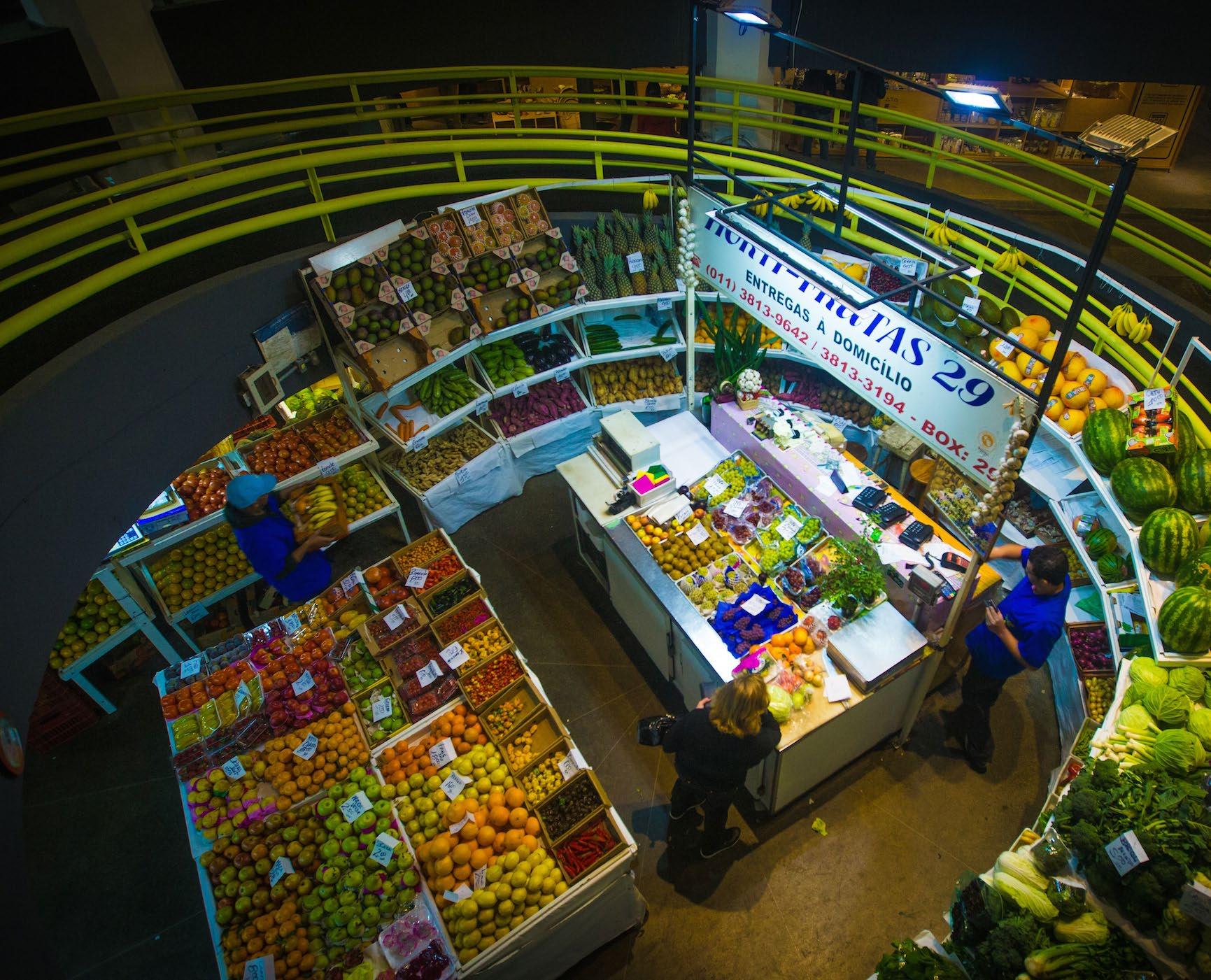
The Food, Beverage & Personal Care sector is vast, producing consumer products that are required every day in human life. It is diverse, comprised of companies at all steps along the value chain that engage in production, distribution and packaging of food, beverage, personal care and household products. It is composed of four industries:
Food & Beverage (F&B)
Overall score: 4.0
The F&B industry has the biggest representation of companies in the data set, with 172 companies benchmarked, representing 55% of the companies in the study. Examples of companies in this industry: Nestlé, PepsiCo, Tyson, and Mondelēz.
Agricultural products (AP)
Overall score: 4.2
Agricultural product companies, numbering 61, comprise approximately 20% of benchmarked companies. Examples of companies in this industry: Cargill, Wilmar, Bunge, and ADM.
Retail (R)
Overall score: 4.9
50 retail companies were benchmarked, making up about 20% of the total companies benchmarked. Examples of companies in this industry: Walmart, Tesco, Costco, and Carrefour.
Personal & Household Products (P&H)
Overall score: 6.0
The personal household industry included 27 companies and constitutes less than 10% of the companies in the benchmark. Examples of companies in this industry: Unilever, L’Oréal, Procter & Gamble, and Reckitt Benckiser.
The majority of benchmarked companies (90%) come from Europe & Central Asia, East Asia & Pacific, and North America. See the company list for all the companies included.
Our universe – SDG2000
In 2020, Global Child Forum joined the World Benchmarking Alliance and adopted their SDG2000 list as the universe from which companies are selected for our Corporate Sector and Children’s Rights Benchmarks.
The benchmark uses an adapted version of the Refinitiv TRCB Sector Classification system for classifying sectors and industries. A company can only belong to one sector and one industry. Companies are classified based on available information about their main business operations/source of revenue.
Source: Global Child Forum data 2022, BCG analysis
Founded in 2009 by the Swedish Royal Family, Global Child Forum is a leading forum for children’s rights and business dedicated to innovative thinking, knowledge-sharing, and networking. We believe in the power and responsibility of business, working in partnership with all parts of society, to create a prosperous, sustainable, and just society for the world’s children. In addition to our forums, Global Child Forum delivers research perspectives, best practices, and risk assessment tools designed to unlock opportunities for businesses to integrate children’s rights into their operations and communities. For more information, please visit www.globalchildforum.org.
Boston Consulting Group partners with leaders in business and society to tackle their most important challenges and capture their greatest opportunities. BCG was the pioneer in business strategy when it was founded in 1963. Today, we work closely with clients to embrace a transformational approach aimed at benefiting all stakeholders—empowering organizations to grow, build sustainable competitive advantage, and drive positive societal impact. Our diverse, global teams bring deep industry and functional expertise and a range of perspectives that question the status quo and spark change. BCG delivers solutions through leading-edge management consulting, technology and design, and corporate and digital ventures. We work in a uniquely collaborative model across the firm and throughout all levels of the client organization, fueled by the goal of helping our clients thrive and enabling them to make the world a better place.
In collaboration with Boston Consulting Group, Global Child Forum initiated the Corporate Sector and Children’s Rights Benchmark series in 2013 to fill a gap in research. The series aims to develop a children’s rights benchmark for the corporate sector, enabling progress to be tracked over time on how businesses address children’s rights. We have benchmarked more than 2,600 companies globally, with more is to come.
With knowledge from our benchmark, the corporate sector is better equipped to meet the demands of financial investors, governments, civil society, and the society in which they operate. Companies can assess their performance in relation to peers in different markets and regions. Our data is also relevant for investors and other stakeholders looking to assess or rank companies.
Photographs used herein are for illustrative purposes only and do not necessarily represent initiatives discussed in the report nor imply any particular attitudes, behaviours, or actions on the part of those who appear in the photographs. All photos, unless otherwise noted, are credited to Global Child Forum, which holds the exclusive copyright to all images in this publication.
Publication date: December 2022 Design: This Way Up Copyright: Global Child Forum
To quote this report, please use the following reference: Global Child Forum, 2022, “The State of Children's Rights and Business – Food, Beverage & Personal Care Deep Dive.”
Global Child Forum bases its benchmark scores on a company’s publicly available information, systematically assessing a corporate’s response to impacts on children’s rights. Scores are not a measure of actual company compliance with policies, outcomes of policies and/or programmes. Final scorecards have been made available to all companies for fact checking purposes, but not all companies acknowledge this review process.
Global Child Forum Storkyrkobrinken 2 S-111 28 Stockholm info@globalchildforum.org www.globalchildforum.org